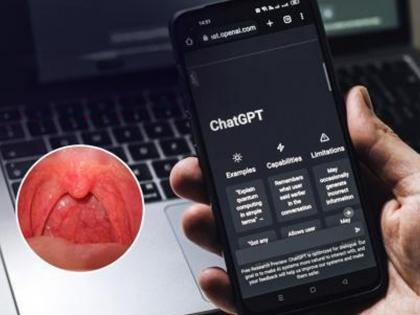ChatGPT Said ‘Nothing Serious,’ But Stage-4 Cancer Nearly Cost an Ireland Man His Life
By Lokmat Times Desk | Updated: August 29, 2025 16:00 IST2025-08-29T16:00:03+5:302025-08-29T16:00:09+5:30
Artificial Intelligence (AI) has increasingly entered workplaces across the globe, but many people are now turning to it for ...

ChatGPT Said ‘Nothing Serious,’ But Stage-4 Cancer Nearly Cost an Ireland Man His Life
Artificial Intelligence (AI) has increasingly entered workplaces across the globe, but many people are now turning to it for personal and health-related advice as well. From everyday problems to serious medical concerns, users are beginning to ask AI tools for guidance. The worrying trend is that people often follow such advice blindly, without professional consultation. Experts warn that this habit could be dangerous, even life-threatening. A recent case in Ireland highlights this risk, where a man suffered severe consequences after trusting AI instead of consulting a qualified doctor.
According to reports, 37-year-old Warren Tierney experienced difficulty swallowing but decided to bypass medical consultation. Instead, he turned to ChatGPT for advice regarding his symptoms. The AI incorrectly assured him that the issue appeared to be minor and that the chances of it being cancer were low. Trusting this response, Tierney delayed seeing a doctor. Unfortunately, medical tests later revealed a far more serious reality—he was diagnosed with Stage 4 esophageal adenocarcinoma, a form of throat cancer that is often detected too late for effective treatment.
Warren, a father of two and a practicing psychologist, admitted that his biggest mistake was relying on AI for medical guidance rather than seeking timely medical advice. His misplaced trust in AI cost him valuable time, during which his illness progressed to an advanced stage. ChatGPT had advised him that his symptoms were not indicative of cancer, suggesting he need not worry. The reality, however, was starkly different. Doctors later informed him that survival rates for esophageal cancer beyond five years remain as low as 5–10 percent globally.
Despite the grim prognosis, Warren has not given up hope. His wife has launched a GoFundMe campaign to raise money for treatment abroad, including in Germany or India, where advanced therapies are available. The case has sparked fresh debate on the role of AI in healthcare decisions. Experts stress that while AI can assist in many areas, it cannot replace professional medical expertise. Similar incidents have occurred elsewhere, including in the US, where a 60-year-old man followed ChatGPT’s advice on dietary changes, leading to iodine deficiency and an ICU admission.
The growing cases serve as a reminder that AI, while powerful, comes with limitations and disclaimers. Companies behind such tools have clarified that their services are not intended to replace professional medical consultation or treatment. Users are urged to treat AI-generated health advice cautiously and always verify with certified healthcare professionals. The Ireland case underscores that while AI is helpful in daily tasks, depending on it for critical health-related decisions can come at a devastating cost.
Open in app